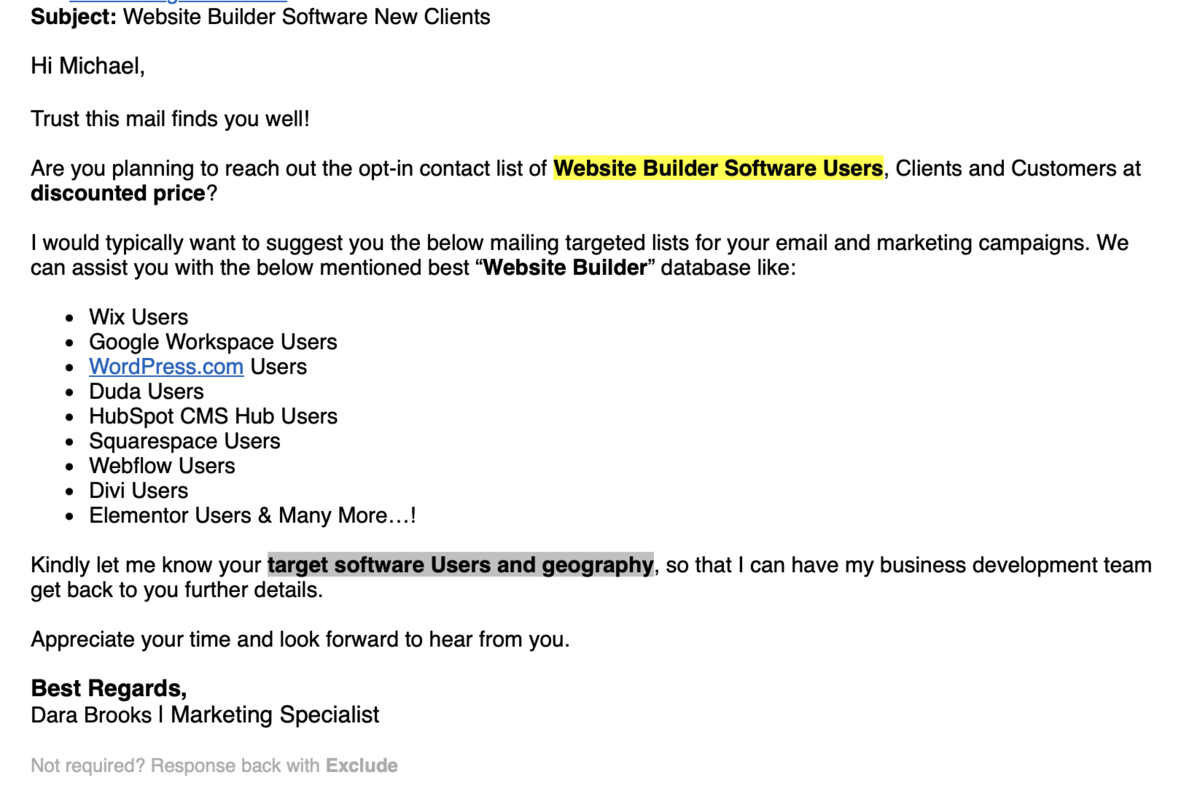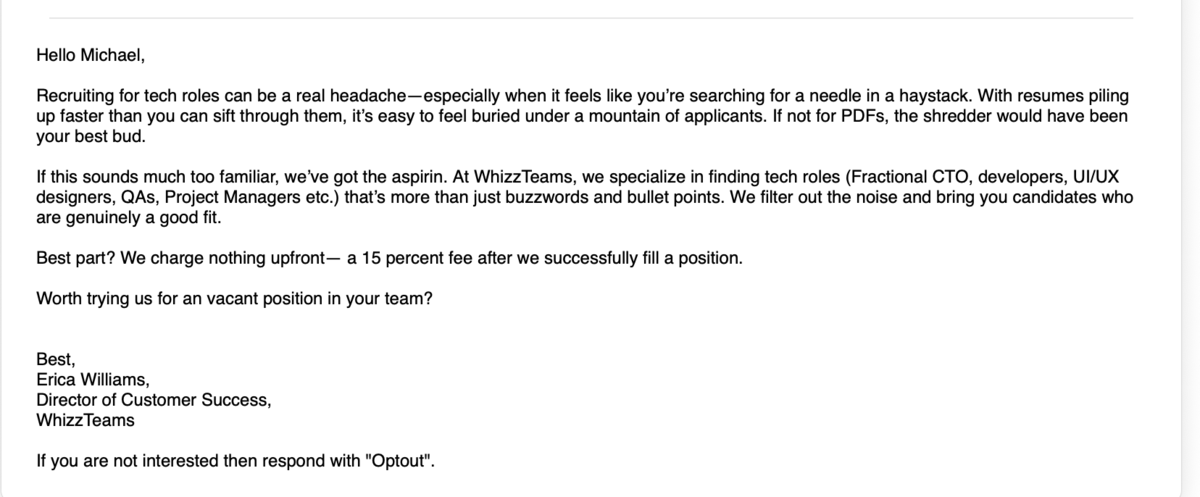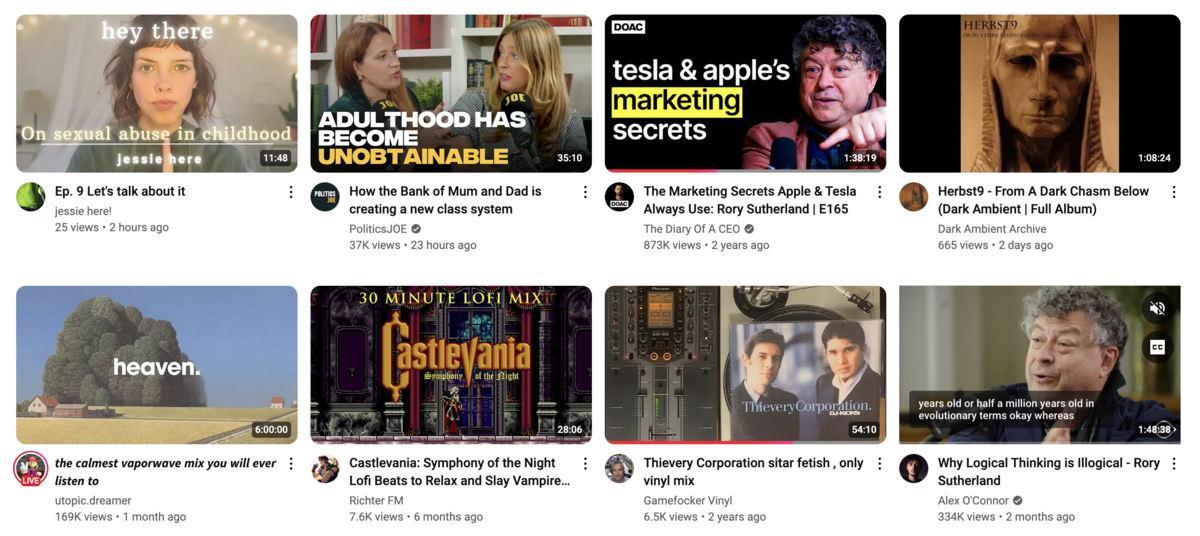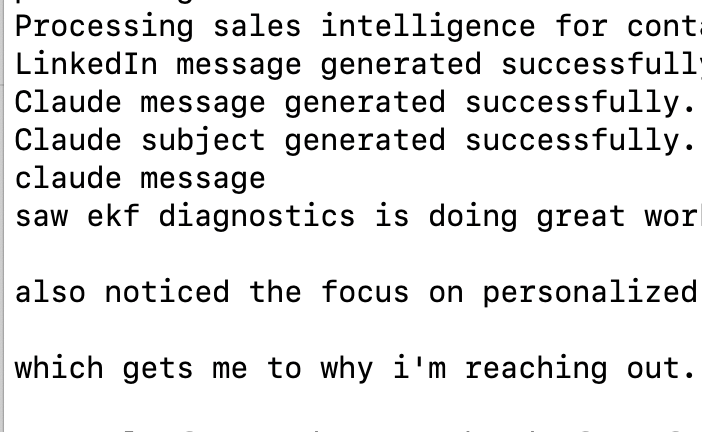[if you're interested in trying it for yourself, write to me here]
Recently I've been dabbling with sending emails to people I don't know.
I want to start a conversation, so they are aware of something that could be useful to their business*.
To do this I need a list of people to write to.
A list of job titles is good enough. I also want to make sure they can afford the product. Then I need their email, twitter, or mobile number etc.
There are websites that handle all this.
I tell these websites who I want to write to, how much money their company should make, in what part of the world their company is (and so on).
Below I put 'Head of Relaxation' as a job title – who knew – three people actually have these job titles.

Super. These websites have made it very easy for anyone to write to anyone to sell stuff.
As a result, like me, you may get a lot of emails & messages out of the blue, from people you don't know. From India, they typically look like this.

And when written in the UK / US, they look like this

US, UK or India – these people want me to buy their stuff. But I don't know them, and what they're writing is all about them them them (rather than me).
I never reply. Neither do most people.
My guess is 1 in 1,000 people reply to cold emails like this. I imagine it takes 5,000 messages to get a customer, maybe more. Maybe 10,000. Or 100,000.
Because software has made it so easy to pull up lists of people to sell to (and email them automatically), this becomes a numbers game.
And so I am receiving more and more of these sorts of emails. Most end up in junk automatically.
Sales + marketing books advise people to speak the language of their audience.
Why? It is so the reader of the email – who doesn't know the writer – at least feels the writer 'gets them + their problems'.
If marketers + sales people had unlimited time, maybe they would write a very-specific email for each person they write to. It would be based on thorough research of the person.
For example, the email from WhizzTeams above was sent to [email protected]. An assistant (or AI agent) researching that site might notice that it links to mrmichael.co. This in turn lists various projects and interests of mine. From flamenco guitar to copywriting and software.
The email could then say
Hi Michael,
Recently came across your flamenco course website – really love the branding. Is Rafael still performing around Europe?
I can see you're into building technology – like the BeCivil website for attorneys. I'd like to ask: do you have a partner to outsource building some of that tech to? It must be hard to build all of the tech and run the operations of it at the same time. At least, as founder of my own business, I know I struggle :)
At WhizzTeams we've worked with several solo entrepreneurs who... (etc)
To do this, whoever writes this cold sales pitch would need to know several things about the target recipient (me):
He has a flamenco guitar course website
He built the technology for an English legal news site
He is an entrepreneur
He is interested in copywriting
He seems to be interested in pondering about how technology affects society and harmful addictions
If one looked at my LinkedIn, we could also work out other things that I have made public information.
All this takes time. Unless I were a very valuable contact – someone who would authorise spending of hundreds of thousands of dollars – no-one would do this kind of manual research (FYI – this is called account based marketing).
Personalized Email Marketing With AI Software – Enter AI Agents
For a recent project I have been cold emailing around 2,000 people a month in the US. However, like the emails above, my emails suck too. About 1% of people reply. It's within industry standard, but it's not great.
It's not my fault. I can write. But we're in an environment where we all receive too many messages every day.
Cold email is, and always will be, at the bottom of the pile. They are almost always ignored**
That's not enough to stop me yet though. What else can I do?
As a prototype, I built an AI agent that takes a target lead, researches them on the internet for any references or mentions. It also reads the website of the company they work for. It then writes the cold email, factoring in the context (what am I trying to achieve? An introduction? An interview? A sales demo?).
When writing the cold email the app is also aware of any relevant trends in that industry and for whatever job type they have. Worth a go, right?!

(sample email to a friend, in his capacity at Self Studio, a branding + tech agency. here the software has directly referenced two projects his studio has worked on. the opening line is all about them, not me, the hypothetical seller, signalling that the writer has 'done their research')

(sample email to another friend, who worked on a music ai website – throwing in some industry trends and a compliment).
The above are the result of a quick prototype. Right now it works out of the box for Apollo, which means they can be sent at scale, automatically, for B2B use cases. It's written to match my own style, which is quick and informal. It handles the more 'professional' language and everything in between - but that is not my personality.
Implications with personalized AI-driven cold email marketing
No doubt these emails perform better than the non-customised ones***. 2 or 3x better. With something really refined and researched, I think it would be 10x better.
Do they work better because the message is more relevant? Or is it because the message reads as if an actual human has put the effort to connect with someone - and the person appreciates the attempt to actually learn about them?
Honestly I think it's a blend of both.
But when this becomes a common thing to do – especially insincere flattery – I think people will lose trust in cold emails****
That would not mean the end of the game for sales people and email marketers. It would just mean that cold email becomes even less effective, and marketers/salespeople move onto something else.
The more 'smart tricks' are used in marketing, the more a counter movement will grow that values authenticity. Action and reaction. I think it will mean the word of mouth referrals and personal networks will become even more valuable, and cold email less so. The barrier to entry is getting too low/
An analogy is with YouTube clickbait thumbnails: after many years of it, the fatigue has set in; I think they are losing efficacy.

I can imagine we will eventually have ai agents on both sides of the interaction. Compared to what happens now, I think that would be a net positive. It would filter out a lot of noise. But maybe sincere and real people, who can't get past the 'algorithm' (ai agent), would lose out. That would be sad. But feels like that dynamic already exists.
I have not thought too deeply about this - but I think we will see what happens soon.
*People who work in sales or marketing will be familiar with this type of work. It is called lead prospecting, top of funnel awareness, sales prospecting and blah blah blah. 6 months down the line, some people will probably buy that product.
**If I wrote a handwritten letter, it would get more of these peoples' attention, but I cannot write 5,000 letters a month**. Some paid-for services would.
*** by non-customised, I mean standard emails using some basic variables such as {name} and some segmentation – eg different copy for different job titles.
**** but if ai agents take over, it will not matter. the ai agent for the recipient won't mind about fake flattery - it will just be filtering for relevance to their principal.

